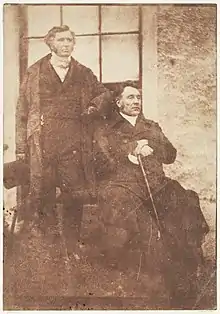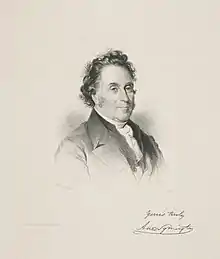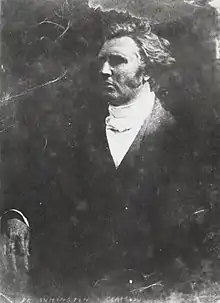Andrew Symington | |
|---|---|
 from A Kirk and a College in the Craigs of Stirling[1] | |
| Church | Paisley |
| Personal details | |
| Born | 26 June 1785 |
| Died | 22 September 1853 (aged 68) |
| minister of Paisley | |
| In office 26 April 1809 – 1853 | |
| Clerk to the Synod of the Reformed Presbytery Synod | |
| In office 1811–1822 | |
| Professor of Divinity to the Reformed Presbytery Synod | |
| In office 1820–1853 | |



Andrew Symington (26 June 1785 – 22 September 1853), was a Scottish minister and teacher. He was ordained in 1809. In 1820 he was appointed professor of theology in the Reformed Presbyterian church.
Life
Andrew Symington was born at Paisley on 26 June 1785, the eldest son of a merchant at the Cross, who gave three members of his family to the ministry.[2] He received his early training at Paisley Grammar School, and then proceeded to the University of Glasgow, where he had taken honours in several departments. In 1803 he graduated M.A. He attended the Hall at Stirling for the sessions 1805–7, and was licensed on November 11, 1807. Three calls were soon after offered to him — Glasgow, Water of Urr, and Paisley. He chose his native place, and was ordained there on April 26, 1809.[3][2]
He was made a D.D. by the Western University of Pennsylvania in 1831, which Glasgow University followed up with the same honour in 1840. In 1811 he was appointed Clerk to the Synod, a post he held till 1822. On the death of his old teacher, John M'Millan, he was called, in 1820, to be Professor of Theology to the denomination. The method he adopted differed from that of his predecessor, for he abandoned expounding the Confession of Faith, and gave lectures on Systematic Theology. When he died, it is said that only six or seven of the missionaries or ministers of the Church had not passed through his hands, while students came from Ireland and America.[2]
With the exception of a few isolated sermons preached on special occasions and one or two introductory biographies to memorial volumes of sermons, he produced little. His Guide for Private Social Prayer, 1823, reached several editions, and the Elements of Divine Truth was published posthumously in 1854. He prepared some of the public documents of the Church.[2]
He died on 22 September 1853- A slight accident had incapacitated him a fortnight before, but his death was unexpected. He met his students in his own house two days before the end. In 1811 he married Jane Stevenson. One of his sons, Andrew, was minister successively at Laurieston and Greenock.[2] His successor was George Glazy, who was ordained 3 October 1854.[4]
Family
By his wife, Jane Stevenson, of Crookedholm, Riccarton, Ayrshire, whom he married in 1811, he had fourteen children, of whom three sons and three daughters survived him.[5]
He married, 18 December 1811, Jane (died 1836) daughter of Robert Stevenson, Esq of Shudderflat, and had issue
- Margaret, Marion
- William. (married, died without issue)
- James, died unmarried
- Margaret
- Marion
- Isabella
- Jane
- Robert, electrician in Glasgow, emigrated to Canada (married Margaret D. Orr)
- Andrew, died young
- Margaret
- Jane Stevenson
- Andrew, R.P.C, Greenock[6]
Publications
Besides numerous tracts and sermons, Symington wrote:
- ‘The Martyr's Monument,’ Paisley, 1847.
- ‘Elements of Divine Truth,’ Edinburgh, 1854, 8vo.[7]
He also contributed ‘The Unity of the Heavenly Church’ (1845) to ‘Essays on Christian Union,’ wrote memoirs of Archibald Mason and Thomas Halliday, which are prefixed to the collected editions of their discourses, and supplied an article on the Reformed Presbyterian church to the ‘Cyclopædia of Religious Denominations,’ 1853, 8vo.[5]
- The God of Paul's Fathers. A sermon. 1813.[8]
- The Dismission, Rest, and Future Glory of the Good and Faithful Servant. A sermon preached on the death of the Rev. Archibald Mason, D.D. 1832.
- The Blood of Faithful Martyrs precious in the sight of the Lord. A sermon. 1834.
- The Child Jesus. A sermon. 1839.
- Private Social Prayer. A sermon. 1840.
- Death Swallowed up in Victory; a sermon preached on the death of the Rev. William Goold, senior minister of the Reformed Presbyterian Congregation, Edinburgh. Published by request. Third edition. Edinburgh, 1844.
- The Martyr's Monument. A Brief View of the Principles and character of the Scottish Martyrs. Paisley, 1847.
- On Intemperance. A sermon
- Guide to Private Social Prayer
- Essay on the Unity of the Heavenly State.
- Tract on the Sabbath.
- Lecture on the Claims of the Church and Society on Young Men. Glasgow, 1850.
- Memoir of the Rev. Thomas Halliday, Airdrie. Prefixed to his Discourses.
- Elements of Divine Truth. A series of Lectures on Christian Theology to Sabbath School Teachers. 8vo. Edinburgh. 1854. Posthumous.[9]
References
Citations
- ↑ Ormond 1897.
- 1 2 3 4 5 Couper 1925.
- ↑ Cowan 1809.
- ↑ Brown 1886.
- 1 2 Carlyle 1898.
- ↑ Robb 2013w.
- ↑ "Introduction on the Principles of the Second Reformation". Reformed Presbyterian Church (Covenanted) - "Steelite" Covenanters. Retrieved 27 December 2021.
- ↑ "Andrew Symington (1785-1853)". Reformed Presbyterian Church (Covenanted) - "Steelite" Covenanters.
- ↑ Anderson 1877.
Sources
- Anderson, William (1877). "Symington, Andrew". The Scottish nation: or, The surnames, families, literature, honours, and biographical history of the people of Scotland. Vol. 3. A. Fullarton & co. p. 548.
 This article incorporates text from this source, which is in the public domain.
This article incorporates text from this source, which is in the public domain.
- Brown, Robert (1886). The history of Paisley, from the Roman period down to 1884. Vol. 2. Paisley: J. & J. Cook. pp. 349-351, et passim.
 This article incorporates text from this source, which is in the public domain.
This article incorporates text from this source, which is in the public domain. - Carlyle, Edward Irving (1898). "Symington, Andrew". In Lee, Sidney (ed.). Dictionary of National Biography. Vol. 55. London: Smith, Elder & Co.
- Couper, W. J. (1925). The Reformed Presbyterian Church in Scotland, its congregations, ministers and students. Scottish Church History Society. pp. 95-96.
- Cowan, John (1809). The duties of the gospel minister : a sermon preached at the ordination of the Rev. Andrew Symington to the pastoral charge of the Reformed Presbyterian Congregation, Paisley, April 26, 1809. Paisley: Stephen Young.
- Hutchison, Matthew (1893). The Reformed Presbyterian Church in Scotland; its origin and history 1680-1876. Paisley: J. and R. Parlane. pp. 269-308.
 This article incorporates text from this source, which is in the public domain.
This article incorporates text from this source, which is in the public domain. - Irving, Joseph (1881). The book of Scotsmen eminent for achievements in arms and arts, church and state, law, legislation, and literature, commerce, science, travel, and philanthropy. Paisley: A. Gardner. p. 513.
 This article incorporates text from this source, which is in the public domain.
This article incorporates text from this source, which is in the public domain. - Ormond, D D (1897). A Kirk and a College in the Craigs of Stirling. Stirling: At the Journal & Advertiser Office. pp. 64-66.
- Robb, James E. (2013w). Cameronian Fasti: Ministers and Missionaries of the Reformed Presbyterian Church of Scotland, 1680-1929. p. 30.
not dated, uploaded 2013
 This article incorporates text from this source, which is in the public domain.
This article incorporates text from this source, which is in the public domain. - Symington, Andrew (1853). Cyclopaedia of religious denominations : containing authentic accounts of the different creeds and systems prevailing throughout the world. London : Griffin. pp. 1–8.
- Symington, Andrew (1856). "XII - Sin and Evil of Sabbath Mails". In Bates, Stewart (ed.). The Christian sabbath : considered in its various aspects. Edinburgh: Religious Tract and Book Society of Scotland. pp. 288-315.
- Symington, William (1853). Departed Worth and Greatness lamented: a sermon on the death of the Rev. Andrew Symington ... Third edition. Paisley: Alex. Gardner.
- SCHSbooks3 (1938). "A Reformed Presbyterian bibliography Part III". Scottish Church History Society: 183–193.
{{cite journal}}: CS1 maint: numeric names: authors list (link) - SCHSbooks4 (1938). "A Reformed Presbyterian bibliography Part IV". Scottish Church History Society: 299–304.
{{cite journal}}: CS1 maint: numeric names: authors list (link)